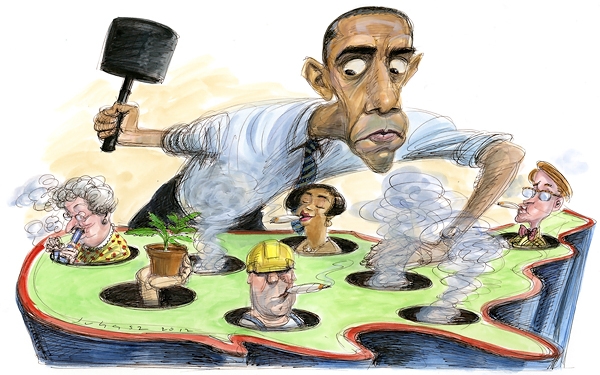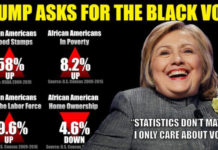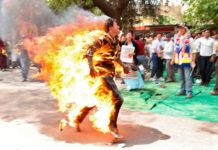Otto Perez Molina is hardly a squeamish liberal. The president of Guatemala, who took office in January, is a retired military general who once served in the country’s brutish special forces (Kaibiles). The day after his inauguration, the silver-thatched leader fulfilled a campaign promise to bring an “iron fist” to lawlessness by militarizing the drug fight in Guatemala.
So it stunned the region when the Guatemalan president, in March, floated a provocative initiative to deal with the violence spiraling out of control in another way: He called for an entire rethink of the war on drugs, including the option of the state running a legally regulated drug market.
The idea of pursuing more liberalized drug policies rather than harsher punishments is hardly novel in Latin America. But such notions are usually championed by intellectuals and academics on the left. They have rarely been promoted by sitting presidents.
Yet 2009 marked a hinge moment: A Latin American commission on drug policy headed by three former presidents, from Mexico, Brazil, and Colombia, published a report declaring the war on drugs a failure – one that desperately needed to shift from repression to prevention.
Two years later, the group pulled former officials and business leaders from around the world into the Global Commission on Drug Policy, which went further, rallying nations to consider ways to regulate drugs rather than just crack down on their use.
Amid this growing consensus, Mr. Perez Molina, and perhaps even more significant, President Juan Manuel Santos of Colombia, began floating similar ideas. At a talk in London in late 2011, Mr. Santos, a former defense minister, said the war on drugs was stuck on a “stationary bike.”
Other leaders rallied to their side, including Laura Chinchilla, the president of Costa Rica. Mexico’s conservative president, Felipe Calderón, while not siding with legalization, has said in moments of exasperation that if US consumption cannot be controlled, the hemisphere should consider “market solutions,” meaning some kind of regulated legal exchange.
Drug policy became a centerpiece of the OAS Summit held in Cartagena in April, too. The organization set a mandate to study drug policy alternatives and deliver a review in a year’s time – what many consider a significant step.
Since then, in the boldest proposal to date, President José Mujica of Uruguay announced the possibility of establishing a legal marijuana market, in which the drug would be produced and distributed under state control. It would be the first market of its kind in the world.
Yet many drug policy experts in the region question whether a state-run exchange could work. Santos in Colombia criticized Mr. Mujica’s plan, saying “unilateral” action is not the way forward. Others say corruption – in Guatemala, for instance – would only empower drug traffickers if there were a legal market. Still others note that talk of legalization, which focuses on marijuana, misses the point since cocaine is the big concern and no one is suggesting legalizing it.
But the debate, which has evolved from one led by activists to former presidents to current heads of state in Latin America, suggests that some kind of fundamental change is inevitable. ”
For former presidents, it is easy to say ‘let’s have a debate’ on a topic that they cannot do anything about,” says Daniel Mejia, who runs a drug policy research center at the University of los Andes in Bogotá. “But having sitting presidents [say that] is a completely new thing that we’ve seen during the past five years.”
While legalization is the buzz word that always draws media attention – and virulent US protests – Latin America is leading the way today in considering a whole range of alternative policy options. It is beginning to focus on drug use as a public health issue, and not a crime, through judicial rulings and legislation, following in the footsteps of Western Europe in the past two decades. Several countries have already introduced decriminalization of possession of small amounts of drugs, mainly marijuana, and are proposing lighter sentences for minor trafficking offenses.
In Argentina, for instance, the Supreme Court ruled in 2009 that it is unconstitutional to punish someone for possessing drugs for personal consumption. Mexico decriminalized personal use that same year, although only for minute quantities.
Colombia’s Constitutional Court in June upheld an earlier law that decriminalized personal consumption of marijuana and cocaine, while lawmakers in Brazil are debating whether to make possessing small quantities a noncriminal offense as well.
The moves mark a swing back from harsher sentences and an escalation of the war on drugs that have been a hallmark of US influence in the region since the 1980s, according to Martin Jelsma, a drug policy expert at the Transnational Institute in the Netherlands.
Bolivia’s changes have been dramatic in their own way. On a recent morning, the Chapare, a New Hampshire-size province in the middle of the country, lies under a heavy mist. Wooden houses propped up on stilts sit among plots of banana trees.
Women in bright velvet skirts and brimmed hats, characteristic of the area’s Quechua Indians, shop at local markets. Chickens scour dirt yards and dogs wander the roads. It’s a peaceful tableau.
Yet the quietude has only come here recently, residents say. Rosa Montaño, who migrated to the Chapare as a young woman, still farms her legally allotted coca field, called a cato, which helps her maintain her home, a small unpainted wooden room. She lives there with her daughter, Irma Cornejo, who grew up in the height of the coca grower conflict, and her grandchildren. Both say dramatic changes have occurred since Bolivian rural police units, backed by the US, stopped coming in and forcing the eradication of coca.
“They brought my brother here and beat him,” Ms. Cornejo says. “Now that doesn’t happen…. It’s calmer now. The kids don’t see those beatings that I’ve seen; and the abuse, it isn’t here anymore.”
Under the current system, the responsibility for inspecting the size of the coca crops lies with the coca-growing unions and a government-monitoring body. It includes satellite surveillance. The Bolivians are backed in the program, called “social control,” with funding from the European Union.










